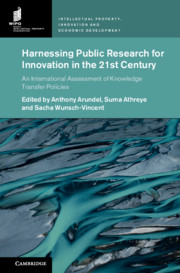Harnessing Public Research for Innovation in the 21st Century
An International Assessment of Knowledge Transfer Policies
Universities and public research institutes play a key role in the innovation ecosystem. Many countries have implemented national strategies to support the commercialization of knowledge produced by public institutions, to help take their innovations and scientific breakthroughs to market and ultimately boost economic growth. Research bodies themselves have also introduced practices to support knowledge transfer activities.
The legal, policy, and institutional approaches to knowledge transfer are diverse, and there is no standardized set of assessment metrics relevant to both high- and middle-income countries. In this context, how can policymakers best help countries and institutions improve the efficiency of their knowledge transfer practices to maximize innovation-driven growth and to seek practical solutions to critical societal challenges?
Comprised of research and insight by esteemed international contributors, Harnessing Public Research for Innovation in the 21st Century addresses this policymaking challenge. It assesses the current role of public research institutions in modern innovation systems and considers how to best optimize existing policies, based on inputs from leading academics, practitioners, and policymakers. It analyses what does and does not work in knowledge transfer practices, policy options, and future measurement priorities, and looks in detail at three high-income and three middle-income country examples. The book provides a useful foundation for future empirical work, the development of appropriate metrics, and for crafting new innovation policy approaches.
“This book represents a major step towards reaching a systematic approach to the measurement of knowledge transfer practices and outcomes.”
Hu Zhijian, President, Chinese Academy of Science and Technology for Development
“Unlike most existing work in this area, this book emphasizes that firms benefit from academic research not only through formal but also more informal channels and from open science, and that there are tensions, as well as complementarities, between these two.”
Bhaven Sampat, Associate Professor, Columbia University
“Enabling access to cutting-edge research is vital to tackling the challenges countries face, and for policymakers, it is thus ever more important to identify which knowledge transfer practices work and which do not. This research is critical in this regard.”
Pippa Hall, Director of Innovation and Chief Economist, Intellectual Property Office, United Kingdom
“This book does an excellent job of identifying key metrics that should be measured by knowledge transfer offices.”
Ragan Robertson, Technology Transfer Officer, University of California, Los Angeles, and Association of University Technology Managers (AUTM) Cabinet Member, Metrics and Surveys, United States of America
“Brazil has established a comprehensive legal framework for innovation. But is that enough? There are barriers that can only be overcome with continuous adjustment of policies. In this context, this book provides good guidance.”
Antenor C.S. Corrêa, Senior Analyst in Science and Technology, and Fernanda V.M. Magalhães, Specialist in Public Policies and Government Management, Federal Government of Brazil
“Going forward, knowledge transfer will play a pivotal role in driving future growth in Africa. We welcome this book and encourage the African measurement community to invest in related metrics.”
Philippe Kuhutama Mawoko, Executive Secretary, African Observatory for Science, Technology and Innovation, African Union Commission

